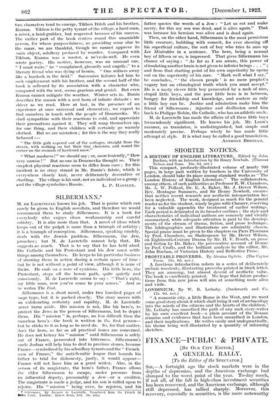SILBERMANN.* M. DE LACRETELLE knows his job. That is praise
which can rarely be given to English novelists, and therefore we would recommend them to study Silbermann. It is a book for everybody Who enjoys clean workmanship and careful artistry. It is also more than that. A novel of ideas which keeps out of the pulpit is more than a triumph of artistry ; it is a triumph of conception. Silbermann, speaking crudely, deals with the Jewish problem. Silberman, the Jew, preaches ; but M. de Lacretelle cannot help that. He suggests as much. That is to say that he has held aloof. His Catholic and his Protestant and his Jew must settle things among themselves. He keeps to his particular business of showing them in action during a certain space of time : but he is not without a point of view, although it is none of theirs. He ends on a note of cynicism. His little hero, the Protestant, steps off the heroic path, quite quietly and consciously. M. de Lacretelle seems to say : " That's right, my little man, now you've come to your senses." And so he writes The End.
Silbermann is a short novel, under two hundred pages of large type, but it is packed closely. The story moves with in exhilarating certainty and rapidity. M. de Lacretelle never turns aside. His mission is not, like his hero's, to protect the Jews in the person of Silbermann, but to depict them. His " mission " is, perhaps, no less difficult than the nameless hero's—the book is written in the, first person— hut he sticks to it as long as he need do. So, for that matter, does the hero, as far as all practical issues are concerned. He does not betray his " mission " until Silbermann is safely out of France, persecuted into bitterness. Silbermann's uncle Joshua will help him to deal in precious stones, because France—symbolized by his schoolboy tyrants and the" French men of France," the anti-Semitic league that hounds his father to trial for dishonesty, justly, it would appear— France will not have him as a great writer. Also, in the person of its magistrate, the hero's father, France allows the elder Silbermann to escape, under pressure from an influential deputy, presumably a Jew—or a creditor. The magistrate is made a judge, and his son is called upon to rejoice. His " mission " being over, he rejoices, and his • Silbermann. By Jacques de Lneretelle. Translated from the French by Ifflan Lunn. London: Ernest Benn, Ltd. We. act,)
father quotes the words of a Jew : " Let us eat and make merry, for this my son was dead, and is alive again." That was because his heroism was alive and is dead again.
Then, on the other hand, Silbermann is the most pernicious little creature, bubbling with conceit, for ever showing off his superficial culture, the sort of boy who tries to sum up Les Miserables in a sentence. The hero, being a normal boy of fifteen or so, is impressed. That gives Silbermann his chance of saying : " As far as I am aware, this power of stimulating another brain is not given to inferior beings . . . " ; and from that starting point of his own superiority he opens out on the superiority of his race. " Mark well what I say,'' he concludes, " the chosen people ' is no mere prophet's vagary but an ethnological truth which you must accept." He is a nasty clever little boy persecuted by a mob of nice, stupid little boys, and the poor little hero is in between, hungry for friendship and knowledge, and austere as only a little boy can be. Justice and admiration make him the friend of Silbermann ; injustice and disillusion send him back to Philippe Robin, the Catholic, who has an athletic uncle.
M. de Lacretelle has made the affairs of all these little boys tremendously significant. He knows his job. Mr. Lunn's manner, as translator, is undistinguished, but simple and moderately precise. Perhaps wisely he has made little attempt at style. It is what may be called a good translation.
ANTHONY BERTRAM.


























































 Previous page
Previous page